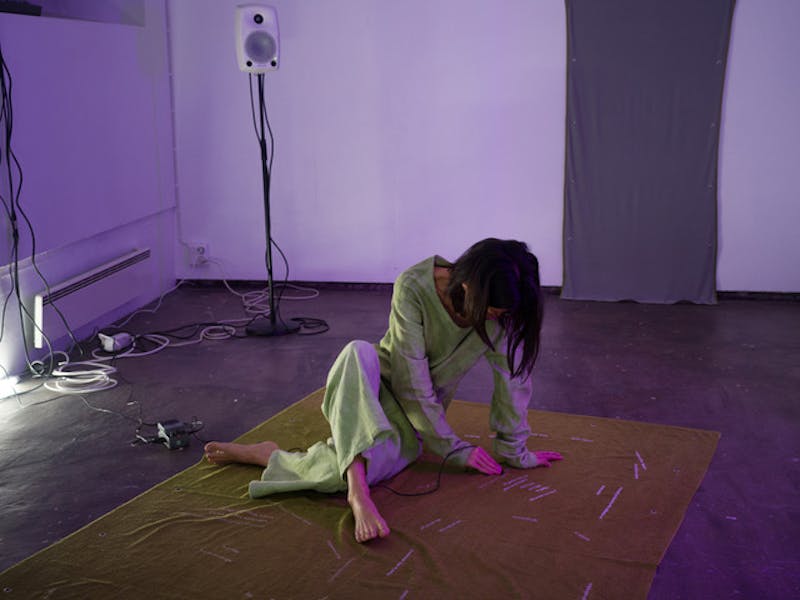‘…I can for a brief interval, devise for myself, a little corner of sloth’.1
This sentence gave me the same fluttering pleasure I have from a freak coincidence, or in a recurring dream: when seemingly disparate moments felicitously merge. On reading Barthes’ line, I hastily highlighted it – making sure I affirmed my excitement with multiple swathes of fluorescent ink. Eventually, after duly logging it and marking the page with an index card, I sent the clipping to Yoojin, who joined me in appreciating Barthes’ words, as she was sat, germanely, in a little corner of sloth at her East London studio, researching the symbiotic algae that grows on a sloth's coat, preparing for her residency at Titanik in Turku, Finland later that month.
You may have seen Yoojin’s artwork before: mesmerising site-specific, sculptural and performative configurations. Or heard it: she makes palpitating soundscapes in collaboration with artist Giuseppe Termine. Or even read it: Yoojin writes poems and publishes books. If so, you will know that whatever the medium or method, it’s likely to be an interpretation of or incantation on... slowness. She reflects on her childhood in South Korea, and says she found the competitive demand for success overbearing. Yoojin has discovered that, for all her tireless activity and creation, there are advantages to protracting the moment, to not rushing. Eventually, having moved away to live and study with short stints in Amsterdam, New York, Tokyo, and London, where she is currently based, Yoojin would then begin to steadily blur her everyday habits with the artworks she’d make, creating an ongoing life’s work, a celebration and exploration of going slow.
Slow: its connotations are mostly pejorative – slow-witted, not understanding readily, dull, uninteresting, not learning easily, slow on the uptake, tedious, slow-coach, slack, the slow lane, sluggish. But Yoojin seeks to ‘unlearn the narrow sense of the word and redefine it’. She regards slowness as a positive: slow but sure. One of her earliest ventures into slowness, which now spans a decade, is the 2015 film sleeping (in ‘a city that never sleeps’). In this we see Yoojin bedding down in a laundrette and supermarket during a New York evening; as the film and the night proceed, everywhere becomes busy and bustling, bristling with people, as she continues to lie rebelliously asleep. The film is an overt portrayal of what she calls ‘contradictions’ in the levels of speed people perform their everyday lives.
Now five years on and after many iterations – a radio broadcast, a script, embroidered hand-made clothing and a book, among others – slowth (habitats) is an installation comprising of Yoojin’s myriad of things. There are textile banners, contact microphones, sheaths of algae-foxed fabric and speakers on stands. By ruminating on slowness, Yoojin became fascinated by the glacial movements of sloths: they signify ‘laziness’ in the seven deadly sins, sleep for fifteen hours a day in trees, and are so slow they have allowed an algae called ‘Trichophilus welckeri’ to inhabit their matted hair in streaks of camouflaging green, almost as if they are completely without animation.

Installation view: Yoojin Lee, slowth (habitats), 2020
For slowth (habitats), Yoojin collaborated with bio-design studio, Post Carbon Lab, who develop microorganisms including an algae that grows on the surface of cotton – it makes her feel, she says, 'closer to the sloth’s way of being’. Returning to the ‘contradictions’, Yoojin notices that sloths ‘make you wonder about what's active or inactive, productive or nonproductive and everything else that falls in between’. By stopping and listening to the layered sounds, Yoojin’s little corner of sloth encourages us to slow down, too, and inevitably reassess sloth and slothfulness not as a sin but a virtue which permits greater insight.
Roland Barthes, A Lover's Discourse: Fragments, 1978.